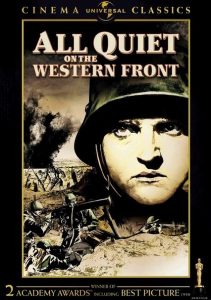All Quiet on the Western Front-1930
Director Lewis Milestone
Starring Lew Ayres
Top 250 Films #213
Scott’s Review #820
Reviewed October 12, 2018
Grade: A
All Quiet on the Western Front (1930) is one of the oldest films I have seen. It is a masterpiece that resonates in present times just as much as it did nearly one hundred years ago.
The work of art presents an astounding Anti-war message that is a timeless lesson in humanity, idealism, and despair.
Based on the banned novel by Erich Maria Remarque, much of the action takes place on the front lines during World War I.
The cameras follow an anxious group of spirited young men as they sit in a classroom and listen to a passionate speech given by their professor.
He is pretty “pro-war,” instilling patriotism in the boys and emphasizing the importance of serving the Army and their country. At his urging, the group, led by Paul Baumer (Lew Ayres), joins the Second Company. Once enlisted, the youths are enlightened that war is not fun, and their romantic delusions are smashed.
Paul is the film’s hero, and events are told through his eyes, offering his perspective. Beginning as a young recruit, he ages quickly and sees friends and allies slaughtered senselessly.
One recruit, frightened to death, is blinded by shrapnel and hysterically runs into machine-gun fire, resulting in his death. Other scenes involving the soldiers forced to go without food only to finally be offered more food, simply because there are so many dead, are heart-wrenching.
Paul is portrayed as a good man, conflicted by how he is supposed to feel towards the enemy and how he sees people as human beings. At the young age of nineteen, he possesses an innocence toward the world.
When he returns home on leave, the townspeople do not acknowledge the ravages of war. When Paul recounts the brutal situations on the front line, he is derided as a coward.
In an excruciating scene, Paul is trapped overnight in a foxhole with a dying French soldier whom Paul has stabbed in a cemetery. He desperately tries to save the man’s life, but to no avail.
In this crucial scene, Paul sees the enemy soldier as a human being rather than someone to hate. He crumbles into tears for the dead soldier, begging him to speak. The scene is incredibly poignant and meaningful.
The final scene of All Quiet on the Western Front is lovely and memorable. It is the film’s most remembered scene and is firmly ensconced in cinematic history.
As a wounded Paul lies hiding from German soldiers, he spots a beautiful butterfly peacefully circling. Paul smiles, enamored with the pretty creature amid all the horror. He desperately tries to reach for the gorgeous insect.
What happens next is heartbreaking and fraught with the unfair ruining of life—the scene is of the utmost importance.
The film is both sad and poignant, as we are well into the twenty-first century, and wars continue.
Have we learned nothing?
Director Lewis Milestone brazenly and tragically paints a portrait of war’s foolishness and the senseless loss of life it results in. It is tough to think of an equivalent film that depicts this message more clearly.
Many European leaders and countries, including Germany’s Adolf Hitler, banned All Quiet on the Western Front throughout the 1930s and 1940s.
The film has remained controversial in its blatant depiction of war since its release.
All Quiet on the Western Front (1930) is a groundbreaking film that should remind us how precious life is.
The novel and film were both made after World War I—how profound to think that since this film was made, wars such as World War II, the Korean War, and the Vietnam War have occurred. Is war ever really the answer?
Anyone who watches this terrific film will find out.
Oscar Nominations: 2 wins-Best Picture (won), Best Director (won), Best Writing, Best Cinematography
